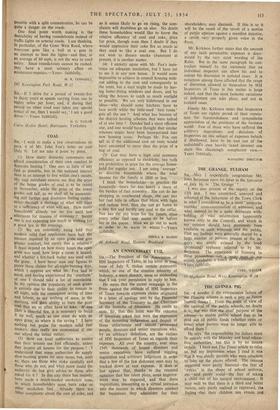AN UNNECESSARY EV1L
SIR,—The President of the Association of HM Inspectors of Taxes, in his letter in your issue of July 9, makes certain statements which, to one of the creative minority of Industry, a mere director, seem so misleading that I ask your permission to reply to him.
He states that the recent campaign in the Press against the attitude of HM Inspectors of Taxes towards expenses claims originated in a letter of apology sent by the Financial Secretary of the Treasury to the Chairman of the Instiotte of Directors. He omits to state, Sir, that this letter was the outcome of questions asked that were the expression of the mounting indignation and despair of those unfortunate and almost ' persecuted people, directors and senior executives who, by an arbitrary definition, are the victims of HM Inspectors of Taxes as regards their expenses. All over the country, ever since 1949, thousands of honest directors and senior executives have suffered niggling inquisition and arbitrary judgement in order that a few of the few dishonest ones may be tracked down at vast expense. It does at last appear that, thanks to the resented agitation that has taken place, some improve- ment may be expected, and that these inquisitions, amounting to a virtual intrusion into the manner in which directors conduct the businesses they administer for their
shareholders, may diminish. If this is so it will be the result of the revolt of a section of public opinion against a manifest injustice, a revolt. very properly given voice in the Press.
Mr. Kirkncss further states that the amount of any kuch permissible expenses is deter- mined by the very strict wording of the Rules. But in the same paragraph he con- tradicts himself by the statement that an individual inspector. can allow his zeal to outrun his discretion in isolated cases. It is notorious a(nong those affected that the range of discretion allowed to themselves by HM Inspectors of Taxes in this matter is large indeed, and that the most fantastic variations of judgerrient can take place, and not in isolated cases.
Finally Mr. Kirkness states that Inspectors of Taxes are rightly' proud of their reputa- tion for fairmindedness and sympathetic appreciation of the problems of the business world. Few of those who have suffered the arbitrary inquisitions and decisions of Inspectors on this subject of expenses (which if disallowed,' have to be met out of the individual's own heavily taxed income) can share this charmingly complacent view.— Yours faithfully,
MANAGING DIRECTOR


































 Previous page
Previous page